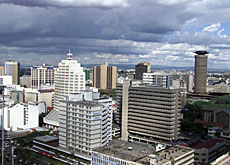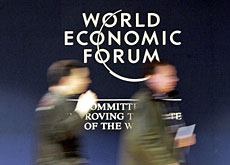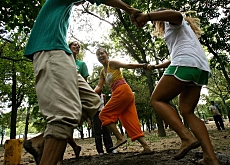Alternative Davos meets in Nairobi

Swiss delegates are among those meeting in Nairobi, Kenya, for the World Social Forum (WSF). High on the agenda this year is the global fight against poverty.
More than 100,000 people from non-governmental organisations and social movements are taking part in the seventh WSF, which got under way on Saturday.
The WSF was launched in 2001 in response to growing mistrust of the annual World Economic Forum (WEF) meeting in Davos, Switzerland, which is also held in January. It is said to be the largest meeting of its kind.
This year marks the first time that the WSF is being held entirely in Africa. It follows on from last year’s decision to split the events into a series of three meetings in separate countries – Mali, Venezuela and Pakistan.
“Until now, the social forums, with the exception of the 2004 edition in India, have been dominated by the Latin-Americans and Europeans,” said Pepo Hofstetter, spokesman for Alliance Sud, a group of six leading Swiss development organisations.
“In Nairobi, the African movements will also be making their voice heard.”
Themes that are important to Africa make up much of the WSF programme, with Aids, migration, women, armed conflicts, and foreign debt all being debated.
For the Brazilian Chico Whitaker, one of the founders of the WSF, Nairobi promises to be “a place where the African peoples and nations meet the world and the world meets Africa”.
Strengthen
However, concerns have been raised that the five-day Nairobi forum could be dominated by the larger NGOs and churches because social organisations in Africa are still relatively weak.
“The forum could nevertheless help to strengthen civil society in Africa, which has long been repressed by dictatorial regimes,” said Carlo Sommaruga, a centre-left Social Democrat parliamentarian and one of three parliamentarians in the Swiss delegation.
A more pressing issue is the difficult political situation in East Africa, particularly in Somalia and the Sudan.
“The immediate problems of the region could force the strategic issues we need to discuss into the background,” warns Sergio Ferrari of NGO E-Changer.
The WSF has come a long way since it was first held in the Brazilian city of Porto Alegre in 2001. “It has grown in terms of both quantity and quality,” said Ferrari.
The E-Changer delegate believes that the WSF meetings have resulted in social movements being able to consolidate their networking.
This opinion is shared by Vania Alleva, of the Swiss Federation of Trade Unions, who will be attending the WSF for the second time.
“At the forum, it is possible to build alliances with social movements from all over the world. For trade unions, this is of vital importance,” she said.
Future?
A key aspect of Nairobi will be the debate on the future of the WSF itself. Some members of the movement fear that it is losing momentum and would like it to adopt a clear political agenda. Others would prefer it to remain a place of open debate.
The fourth day of the forum will be devoted to planning campaigns for 2007 and 2008. “What I expect from Nairobi is a progression from an emphasis on resisting globalisation to more co-ordinated actions and concrete alternative proposals,” said Sommaruga.
The Swiss delegation to the WSF in Nairobi is made up of 35 people – parliamentarians, representatives from NGOs and trade unions, journalists and two officials from the Swiss Agency for Development and Cooperation (SDC).
“It includes slightly fewer people than in 2004 and 2005, but the trade unions are strongly represented,” said Ferrari.
The Swiss delegates are aiming to take an active part in the various forum activities, along with their international partners.
swissinfo, Andrea Tognina
The World Social Forum is the most important international meeting of NGOs and social organisation opposed to globalisation.
Conceived in response to the Davos World Economic Forum, which is held at the same time of year, the WSF first took place in 2001, in the Brazilian city of Porto Alegre.
The slogan adopted for all sessions of the WSF has been “Another world is possible”.
This year the WSF runs from January 20 to 25.
Alliance Sud, a group of six leading Swiss development organisations, will be supporting the formation of tax justice in Africa network (part of the global Tax Justice Network) and the activities of the right-to-water movement.
The Social Democrat party, the Federation of Swiss Trade Unions and the NGO Swiss Labour Assistance will be involved in the launch of the “Decent Work Decent Life” campaign.
Sacrificio Quaresimale, a Catholic charity, will be co-organising a seminar on the impact of oil and gas extraction on development.
The Swiss section of the NGO Terre des Hommes will present an art project involving 20 young people from Colombia, Switzerland and a number of African countries.
As in 2005, a group of young people on a study trip from Geneva will also be present at the forum.

In compliance with the JTI standards
More: SWI swissinfo.ch certified by the Journalism Trust Initiative


You can find an overview of ongoing debates with our journalists here. Please join us!
If you want to start a conversation about a topic raised in this article or want to report factual errors, email us at english@swissinfo.ch.